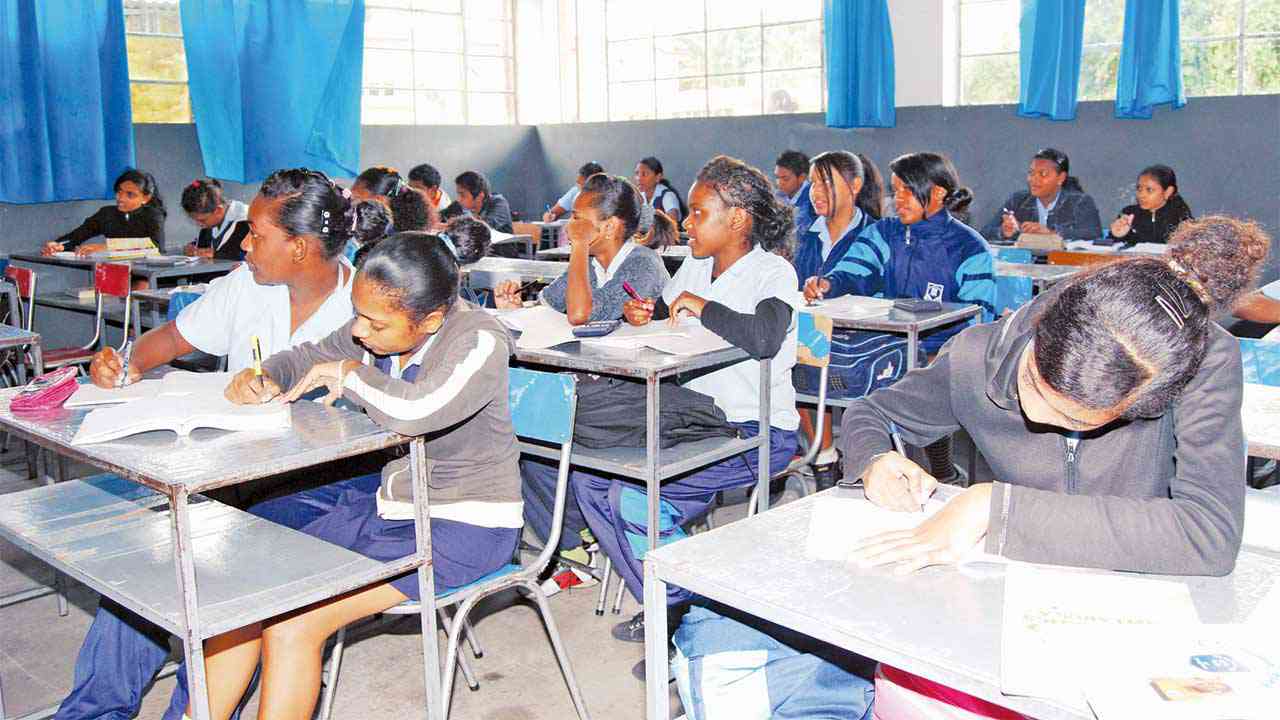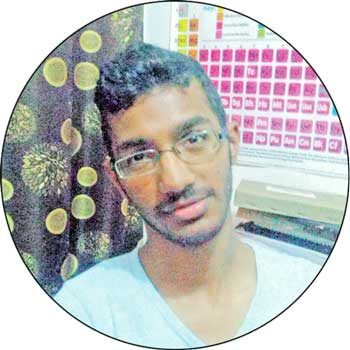
There has been a lot of turmoil in colleges last week. Students have resorted to sit-ins across the island. The main dispute is whether the 90% attendance should be compulsory? Young professionals debate this issue.
The compulsory 90% attendance to benefit from the State subsidy for SC or HSC exams has led to much uproar and left students and parents in a confused, chaotic state. Since the start of the third term, secondary schools around the island have been preparing for the final exams. However, it is more a feeling of anger and frustration that has been prevailing over the past few days. In its Government Program 2015-2019, the ruling Alliance Lepep government highlighted that “full subsidies on SC and HSC examinations will be extended indiscriminately to all pupils irrespective of their social background.” However, a pre-condition has been added to that, students will have to show a 90% attendance rate in order to benefit from the subsidies. Those who don't will have to pay the full cost of the exams.
 Dhirish Krishna Raghoo: “It is unfair to impose such conditions”
Dhirish Krishna Raghoo: “It is unfair to impose such conditions”
Dhirish Krishna Raghoo argues that forcing children to go to school will only resolve the problem of absenteeism, but it will not change our main concern: why our educational system is failing? “It is unfair to impose such conditions on students. And, neither should we bow to their obstinacy. Education has played a key role since our Independence. Youngsters are the future of this country. One of the main reasons that the students tend to be ‘better off’ at home, is because all the materials that were previously provided by the teachers are now available on the internet. We are moving away from the traditional ‘spoon-feeding’ system to a more self-learning process, which is good, but not supported by our current education system. The government is spending billions in the education sector each year and is also coming up with structural reforms to remediate a weakened system. I believe that our youth has the legitimate rights to influence government policies. They should come forward with proposals that will shape our country, instead of simply opposing current situations, and thus being stagnant. It is important for our students to foster a new culture; instead of staying at home before the exams, they should be encouraged to go to school, where they should be trained to be more dynamic and at the same time learn to control stress.”
 Pratish Komul: “90% attendance should not be compulsory”
Pratish Komul: “90% attendance should not be compulsory”
Pratish states that the 90 per cent of attendance need not be compulsory. “Almost all students who successfully succeeded in their exams or were even laureates in colleges didn’t have 90% attendance, but still managed to perform very well. These students may have had a good revision planning, thus going to schools in order to acquire information and work them out at home. Students from poor families are more prone to sickness, work one or two days a week or even, work before going to school to be able to support their families or bear their expenses. We all were students once and we all know how stressful are the days during revisions till the end of the exams days, but to succeed it is utmost necessary and important to have a good sleep, a calm mind, and the correct pace for students to assimilate what they have learned over two years. The government decision regarding the 90% attendance will rather lower the pass rate. It will not take long to know the passing rate compared to last year.”
10 essential study tips for final exams
Learn how to create an effective study plan so that you can walk into your tests stress-free and confident.
There’s no sugarcoating it: studying for final exams is extremely painful. These monstrous tests are standing in the way between you and your summer break, but that doesn’t mean that you can slack off and sip iced tea by the pool. Now is the time to focus, as these test grades reflect the hard work that you’ve put in throughout the entire school year. We asked academic experts for their advice on when to begin studying, how to know when it’s time to stop, and what to do the morning of an exam.
Understand your goals
“Students follow a series of requirements, and it becomes very easy to feel like you’re simply jumping through a series of hoops as opposed to understanding why that class and that test are relevant to you,” says Colin Gruenwald of Kaplan Test Prep. “You have to ask why you’re going to invest the time and energy to do well on a test. Why do you intend to be the student who gets an A?”
Prioritize the tests that matter the most
“It’s a mistake to consider all of your finals equal if you’re materially better at one subject than another,” says Gruenwald. “Some students think that they should commit equal time to studying for each test. They’re taking away from their opportunity to really commit time where they need it.”
Clarify the content and format of your exams
“Find out what the test is going to cover,” says Ted Dorsey, author of Tutor Ted’s Guide to the SAT. “Ask what the format is—multiple choice, essay, or both. Once you begin studying, bring any questions you have to your teachers. Most teachers will be happy to help you.”
Aim to begin studying at least one month in advance
“Everyone knows that studying a little bit over a long period of time is absolutely, undeniably the right way to study, and yet we are all terrible at actually putting this plan into effect,” says Gruenwald. “The best time to start studying is at the beginning of the class. Set aside a little time each week to sit down and organize your notes and think about what’s going well and what’s going badly. Three to four weeks ahead of time is the latest that you want to create a study plan for yourself. Cramming is toxic.”
Learn how you study best
“Everyone learns differently,” says Dorsey. “Just because your friend makes color-coded outlines, it doesn’t mean that’s the best way for you to study too. Change the lyrics of a song you know to help you memorize the countries of Africa. Write a funny story about the characters in The Scarlet Letter. Any studying is good studying, so do it the way that works best for you.”
Take snack breaks
“When you study, your brain consumes glucose,” says Dorsey. “Take a five-minute break every hour to let your body produce more fuel for your studying. Take a walk, have a healthy snack (almonds, fruit, and yogurt are good choices), and stretch. Taking breaks will actually improve your studying.”
Know when to stop studying
“Within 12 to 24 hours of the test, it’s time to stop studying,” says Gruenwald. “You’re not going to learn a lot of new content. The likelihood is much higher that you’re going to stress yourself out and confuse yourself. For the last minute studier, flashcards can be a good resource. They can earn you a few more points on test day, and it’s a much healthier thing to do than starting on page one of the textbook.”
Get a good night’s sleep
“Eight hours is ideal for the night before an exam,” says Dorsey. “It may be tempting to stay up late studying, but remember: you’re going to need energy and focus while you’re taking your exam.”
Naturally energize yourself the morning of the test
“Do something stimulating the morning of the test,” says Gruenwald. “Don’t sit down and watch a back-to-back marathon of American Idol; that’s just going to zap your energy level. Instead, read a book, do a crossword puzzle, take your dog for a walk, or get some ercise. Do something that’s going to make you feel alive and positive, and will build up your energy level and confidence in the 24 hours before the test. Please, stay away from caffeine and energy drinks! Your hand will shake so that you can’t write coherent words, and you may crash in the middle of the test.”
Relax
“You’ve survived final exams before, and you’ll survive them this time too,” says Dorsey. “If you’re feeling nervous when you sit down to take the test, take three slow, steady breaths. Remind yourself that you’ve been getting ready for these tests all year long.”
 Zafiir Bholah: “The government has the right to apply this measure”
Zafiir Bholah: “The government has the right to apply this measure”
Zafiir Bholah believes that the new regulation regarding the 90 per cent attendance at school is a very interesting one. “The high percentage of absenteeism among School Certificate and Higher School Certificate students is mainly attributed to the fact that teachers don’t work in class or that the students stay at home for revision, which can be given the benefit of doubt, as most students stay at home to indulge in recreational activities.”
According to him, the government is paying the examination fees for the students so that some burden is taken off the shoulders of those concerned. “Students are taking the school for granted; they already think that since education is free, they have the right to do as they please. This new regulation is here to make sure that students are coming to school regularly so that government funds do not go to waste. This policy brings to light that schools have some authority and students will no longer consider school as being a place for enjoyment and pass time but rather keep its status as a temple of knowledge. Teachers are expected to work till the end of a school year and most educators agree that they will work with one student. Hence, it is a rather poor argument that students are absent because teachers do not work. I expect that the Ministry of Education will stick to its decision.”
 Tariq Jhungeer: “In favour of this measure”
Tariq Jhungeer: “In favour of this measure”
Tariq Jhungeer is in favour of the obligations for students to have 90% attendance in schools. “Educators have a syllabus to complete within a timeframe. If we have excessive absences, what is the teacher bound to do? Should he conduct his class? Or should he wait for everybody to be present in the class so that he may conduct his class? People tend to say educators do not work in class or they simply do not come to school and this is the reason behind absenteeism. If we have free education and if the government is paying the School Certificate and Higher School Certificate examination fees, then the government definitely has the right to legalise 90 per cent attendance in schools and to expect good academic performance from students. It is fair enough if students have the privilege of 10 per cent of absences if ever they fall sick or have any other commitments.”







